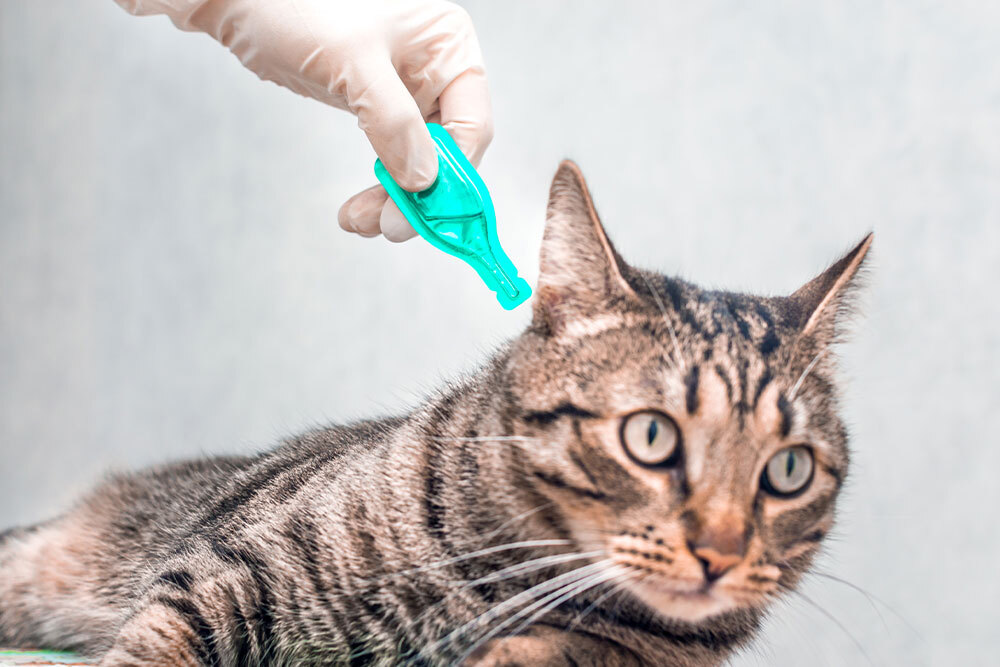In Kissimmee, Florida, life with pets is filled with sunny walks, backyard games, and cozy evenings on the couch. But our beautiful climate comes with a hidden downside—year-round exposure to parasites like fleas, ticks, and heartworms. These pests aren’t just a nuisance—they’re a serious health risk for both cats and dogs.
At Flora Family Vet, we’re committed to helping you protect your pet with proactive, personalized prevention plans that go beyond seasonal care. Whether you’re new to Florida or have lived here for years, understanding the risks—and how to stay ahead of them—is key to keeping your pets safe and comfortable.
Understanding the Threat: Fleas, Ticks, and Heartworms
Fleas
Fleas are blood-feeding insects that can cause intense itching, skin infections, and allergic reactions. A single flea can lay hundreds of eggs, making infestations difficult to control once they begin.
Ticks
Ticks are external parasites that latch onto your pet and can transmit serious diseases like Lyme disease and ehrlichiosis. Tick-borne illnesses can lead to fever, joint pain, and long-term organ damage.
Heartworms
Heartworms are transmitted by mosquitoes and migrate through your pet’s bloodstream, eventually invading the heart, lungs, and major vessels. Untreated, heartworm disease is often fatal. Just how many cases of heartworm are there? Check out the Canine Heartworm Prevalence Map.
Florida’s warm, humid weather allows these parasites to remain active all year. That means skipping even one month of prevention can leave your pet vulnerable. Learn more about the importance of year-round parasite prevention in this essential guide.
Why Year-Round Prevention Is Essential
Contrary to common belief, Florida’s “winter” doesn’t offer a break from parasite threats. Mild temperatures and high humidity allow mosquitoes, fleas, and ticks to thrive even in cooler months.
Preventive medications—administered monthly—are the most effective way to stop infestations and infections before they start. They also help you avoid:
- Costly emergency treatments
- Long-term health complications
- The emotional toll of watching your pet suffer
Spotting the Symptoms of Parasite Exposure
Early detection is key. Watch for these signs:
Fleas
- Excessive scratching or biting at the skin
- Visible flea dirt (black specks) or live fleas
- Red, irritated skin
- Hair loss or scabs
Learn more about Flea Allergy Dermatitis, a common reaction in both dogs and cats.
Ticks
- Lumps or attached ticks on the body
- Lethargy or reluctance to move
- Swollen joints or fever
Heartworms
- Persistent coughing
- Fatigue after mild activity
- Weight loss and appetite changes
- In severe cases: difficulty breathing or fainting
Because heartworm disease often shows no symptoms until it becomes advanced, routine testing and prevention are critical. Learn more about this disease from the American Heartworm Society.
How Parasites Progress Without Treatment
Each of these parasites can cause more than temporary discomfort—they can result in chronic or life-threatening conditions:
- Fleas can trigger anemia, severe allergies, or spread tapeworms.
- Ticks can transmit diseases that lead to organ damage, neurological issues, or long-term pain.
- Heartworms can cause irreversible heart and lung damage, requiring intensive treatment or surgery.
Visit this CDC guide for more on preventing tick-borne illness.
Diagnosing and Treating Parasites
When you visit Flora Family Vet, our team conducts a full physical exam and may recommend:
- Skin checks for fleas and ticks
- Blood tests to detect heartworms or tick-borne illness
- Fecal exams to rule out secondary infections
If a parasite is found, we’ll create a treatment plan tailored to your pet, which may include:
- Oral or topical preventatives
- Medicated shampoos or dips
- Antibiotics or anti-parasitic medication
- Heartworm treatment protocols for advanced cases
Prompt treatment is often life-saving—and prevention is always more affordable and less stressful.
Risks of Skipping Prevention
It’s easy to forget a monthly dose or assume your indoor pet isn’t at risk. But the truth is:
- Mosquitoes come indoors, meaning even indoor cats and dogs can get heartworm.
- Fleas and ticks hitch rides on clothing, shoes, or other pets.
- A single missed dose can result in exposure—and some preventatives lose effectiveness if not given consistently.
The long-term costs of treating heartworm or tick-borne illness far outweigh the cost of monthly prevention.
Home Habits That Support Prevention
In addition to medication, daily habits can make a big difference:
- Vacuum carpets and furniture frequently to eliminate flea eggs.
- Check your pet daily for ticks after walks or outdoor play.
- Keep lawns trimmed and avoid overgrown brush.
- Remove standing water to reduce mosquito breeding zones.
- Wash pet bedding regularly in hot water.
These simple steps reduce environmental risks and make medications more effective.
Preparing for Your Appointment
A successful parasite prevention plan starts with a comprehensive visit. Bring:
- Notes on symptoms, behavior, or changes in energy
- A list of current medications and previous preventatives
- Photos of skin irritation or parasites, if visible
- Any concerns you’ve noticed—even subtle ones
Questions to Ask Your Vet
- What parasite prevention works best for my pet’s lifestyle?
- How often should my pet be tested for heartworms?
- What are the early signs of tick-borne illness?
- Are there natural ways to support prevention?
FAQs About Parasite Prevention
Can my indoor cat get heartworms or fleas?
Yes—indoor pets are still at risk. Mosquitoes, fleas, and ticks can enter homes through open doors or hitchhike on humans and other pets.
Is it safe to use preventatives all year long?
Yes. Monthly preventatives are designed for long-term use. Your vet will help you choose products that are safe, effective, and appropriate for your pet’s needs.
What are the side effects of parasite preventatives?
Most pets tolerate preventatives very well. Rare side effects may include mild digestive upset or skin sensitivity. Let us know if you notice any changes.

Your Local Partner in Pet Protection
At Flora Family Vet, we believe prevention is the best medicine. Our warm, knowledgeable team is here to provide guidance tailored to your pet’s health, lifestyle, and environment.
Whether you need to update your pet’s prevention plan or have questions about flea, tick, or heartworm risks, we’re here to help. Contact us or meet our team to take the next step in keeping your pet happy, healthy, and parasite-free—all year long.








Leave A Comment